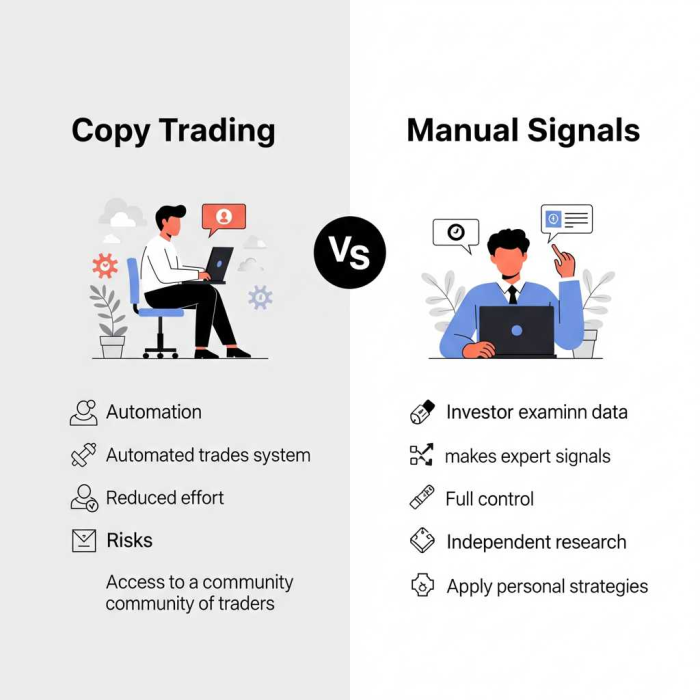Copy Trading vs. Manual Signals| Navigating the Waters of Online Trading
The world of online trading can feel like a vast ocean, full of opportunities and potential pitfalls. For newcomers, or even seasoned traders looking for an edge, two popular approaches often come to the forefront: copy trading and manual signals. Platforms like ZuluTrade, eToro, and DupliTrade have popularized copy trading, while manual signal services offer a different kind of guidance. But which approach is right for you? Let's dive in.

What is Copy Trading?
Copy trading, in essence, is exactly what it sounds like: you automatically copy the trades of experienced and successful traders. These "strategy providers" or "lead traders" open and close positions, and your account mirrors their actions proportionally.
How it Works (Generally):
- Choose a Platform: Platforms like eToro, ZuluTrade, and DupliTrade act as intermediaries.
- Browse Traders: You can browse through a vast database of traders, often filtered by their historical performance, risk level, and assets traded.
- Allocate Funds: You decide how much capital to allocate to copy a particular trader.
- Automatic Execution: Once you've chosen, all their future trades are automatically replicated in your account.
Pros of Copy Trading:
- Accessibility for Beginners: No in-depth market analysis or trading experience is required.
- Time-Saving: You don't need to spend hours monitoring the markets.
- Diversification: You can copy multiple traders with different strategies, spreading your risk.
- Learning Opportunity: By observing successful traders, you can learn about different trading styles and strategies.
Cons of Copy Trading:
- Lack of Control: You have limited direct control over individual trades.
- Past Performance is Not Indicative of Future Results: A trader's past success doesn't guarantee future profits.
- Risk of Copying Bad Trades: Even experienced traders have losing streaks.
- Platform Fees/Commissions: Some platforms or lead traders may charge fees.
What are Manual Signals Platforms?
Manual signals platforms, on the other hand, provide you with trade recommendations. Instead of automatically executing trades, these services send you alerts (via email, SMS, or dedicated apps) detailing specific entry points, exit points, stop-loss levels, and take-profit targets for various financial instruments.
How it Works (Generally):
- Subscribe to a Service: You subscribe to a signal provider, often for a monthly fee.
- Receive Alerts: The provider sends you trade signals based on their analysis.
- Manual Execution: You then manually place these trades in your own brokerage account.
Pros of Manual Signals:
- Full Control: You retain complete control over every trade you execute.
- Educational Value: You can learn why a particular trade is recommended, enhancing your understanding of market analysis.
- Flexibility: You can choose which signals to act on and which to ignore.
Cons of Manual Signals:
- Requires More Time and Effort: You need to be actively present to execute the trades.
- Discipline is Key: You must stick to the recommended parameters (stop-loss, take-profit) for the strategy to be effective.
- Information Overload: Some services might send too many signals, making it difficult to manage.
- Reliance on Provider's Expertise: The quality of your trades is entirely dependent on the accuracy and reliability of the signal provider.
Which Approach is Right for You?
The choice between copy trading and manual signals largely depends on your trading goals, experience level, and available time.
-
Choose Copy Trading if:
- You are a beginner with little to no trading experience.
- You have limited time to dedicate to market analysis.
- You want a more hands-off approach to trading.
- You're comfortable with delegating your trading decisions.
-
Choose Manual Signals if:
- You want to maintain full control over your trades.
- You are looking to learn and improve your own trading skills.
- You have the time and discipline to manually execute trades.
- You prefer to understand the rationale behind each trading decision.
Popular Platforms for Copy Trading:
- eToro: One of the pioneers in social trading, eToro offers a user-friendly interface and a large community of traders to copy.
- ZuluTrade: Known for its extensive range of strategy providers and advanced features for analyzing performance.
- DupliTrade: A more exclusive platform that partners with professional and vetted traders, offering a curated selection of strategies.
Conclusion
Both copy trading and manual signals offer legitimate pathways into the financial markets. Copy trading provides an excellent entry point for those seeking simplicity and automation, while manual signals cater to traders who desire more control and a deeper understanding of market dynamics. Before you embark on either path, always conduct thorough research, understand the risks involved, and choose a reputable platform or signal provider that aligns with your individual trading objectives. Happy trading!
Popular Tags